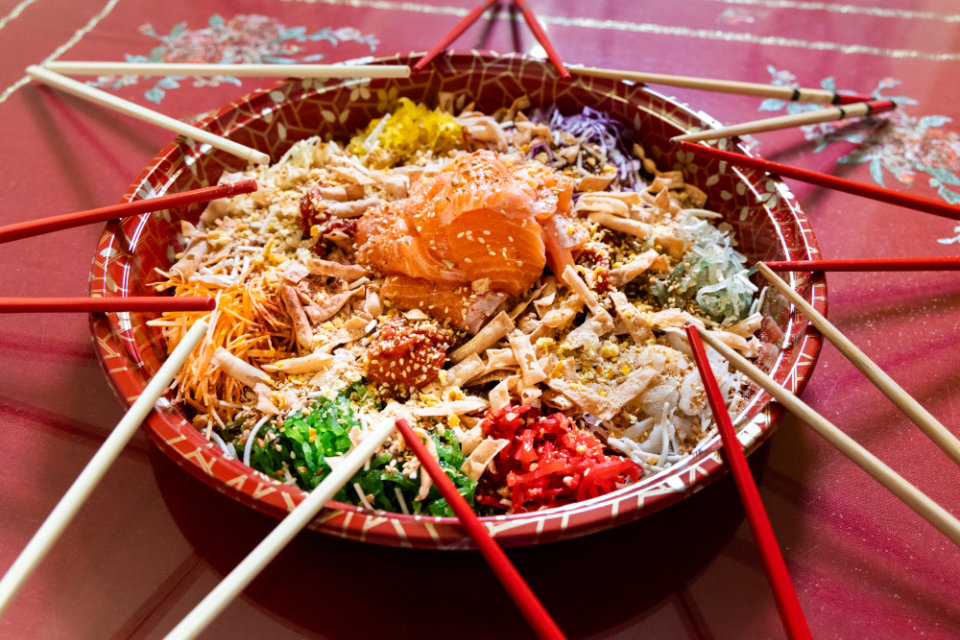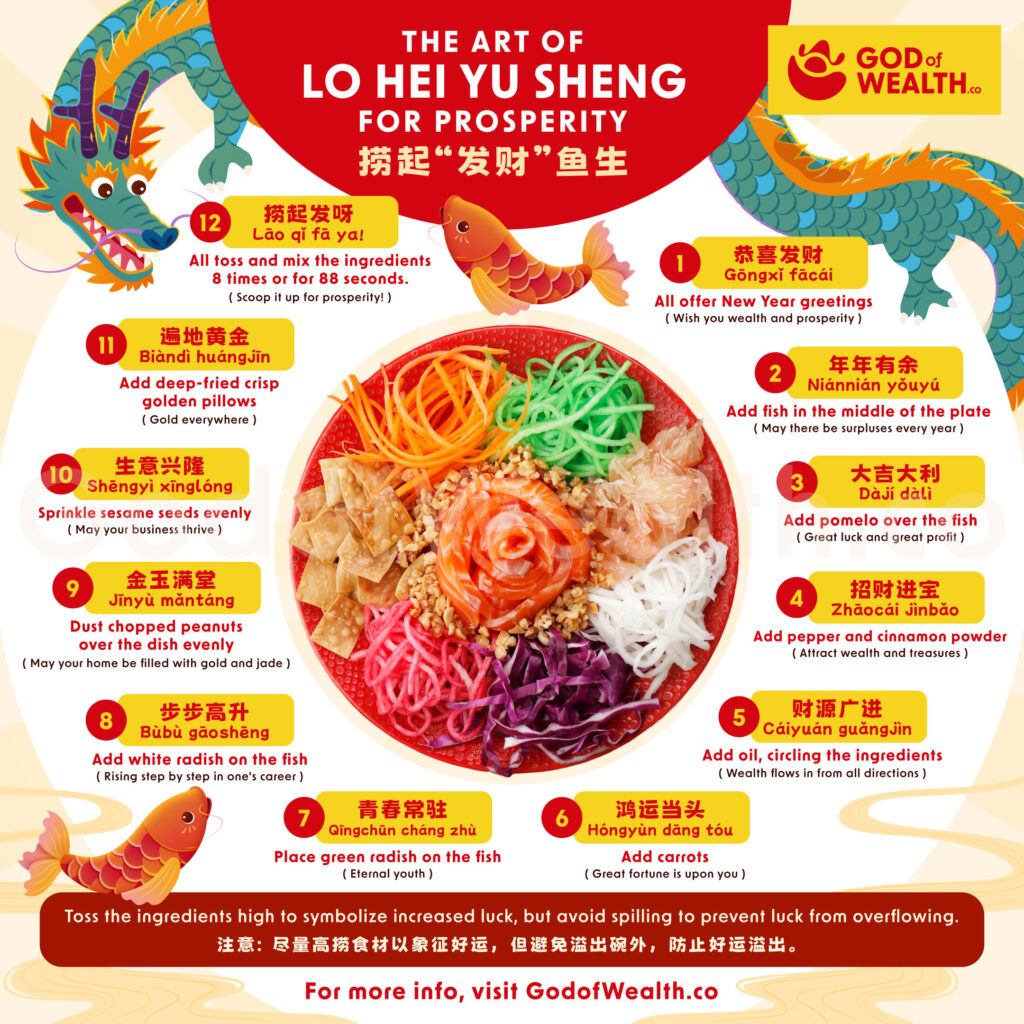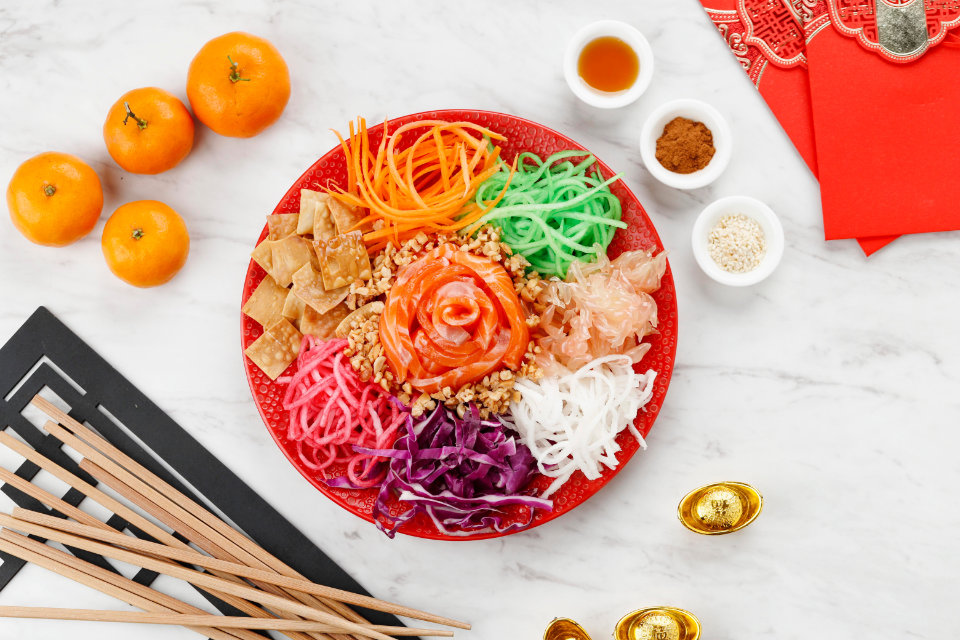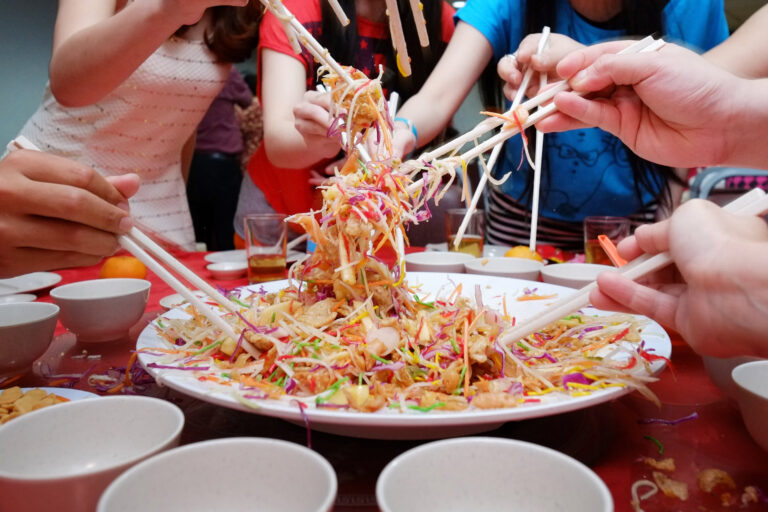Prosperity Toss, Lao Yusheng (捞鱼生), also known as Lo Hei, is a traditional Chinese dish that embodies wishes for prosperity and good fortune, especially popular during the Lunar New Year and Renri celebrations.
Here’s a step-by-step guide on preparing Yusheng, including the phrases to say during the prosperity toss to incorporate the best Renri greetings, along with the meaning of each ingredient.
Table of Contents
How to Lo Hei for Prosperity: Step-by-Step Guide

Learn the traditional way to Lo Hei with Yusheng, a celebratory toss for prosperity and good fortune during the Lunar New Year.
Total time: 8 minutes
Gather family and friends around the Yusheng plate
Start your Lo Hei celebration by bringing family and friends together around the table where the Yusheng is spread out on a large serving plate. This communal gathering sets the stage for the ceremony.
Add the Ingredients with Auspicious Phrases
Introduce each ingredient to the Yusheng plate one by one. As you do, recite the corresponding auspicious phrases that wish for prosperity, health, and abundance. This ritual infuses the dish with positive energy and meaning.
Commence the Prosperity Toss Together
With everyone ready, count down and then lift the ingredients high into the air with chopsticks while joyfully exclaiming “Lo Hei!” and other prosperous greetings. The higher the toss, the greater the fortune believed to be bestowed.
Mix and Unite for Prosperity
Together, continue to toss and mix the Yusheng, ensuring every ingredient is well combined. This action symbolizes the blending of good wishes and the unity of those partaking in the celebration.
Savor the Yusheng
Once mixed, enjoy the Yusheng with your group. Eating the salad symbolizes ingesting the good luck and blessings for the year ahead. Share this moment of joy and savor the flavors that represent the sweetness, growth, and prosperity to come.

Prosperity Toss Phrases:
- Carrots (红萝卜) – “Wishing you good luck for the coming year (愿你新的一年好运连连, 鸿运当头).”
- Meaning: Prosperity
- Green Radish (青萝卜) – “May our youthful vigor be eternal (青春永驻,风华常存).”
- Meaning: Eternal youth
- White Radish (白萝卜) – “May business flourish and soar to greater heights (生意兴隆,步步高升).”
- Meaning: Business prosperity
- Raw Fish (生鱼) / Salmon (三文鱼) – “Abundance through the year (年年有余).”
- Meaning: Abundance and prosperity. Salmon is often used for its rich color and texture, symbolizing wealth and abundance.
- Pomelo or Lime (柚子/酸柑) – “May good luck and smooth sailing come your way (大吉大利,一帆风顺).”
- Meaning: Luck and auspiciousness
- Pepper and Cinnamon Powder (胡椒粉) – “Attract wealth and treasures (招财进宝).”
- Meaning: Wealth
- Oil (油) – “May your life flow smoothly (事事如意,顺顺利利).”
- Meaning: Smooth sailing
- Crackers (薄饼) – “May your floor be filled with gold (遍地黄金).”
- Meaning: Wealth
- Peanuts and Sesame Seeds (花生碎和芝麻) – “May your home be filled with gold and silver, and your business thrive (家里金银满屋, 生意兴隆).”
- Meaning: Wealth and happiness
- Plum Sauce (酸梅酱) – “May your life be sweet (生活甜甜蜜蜜).”
- Meaning: Sweetness and harmony in life
Additional Ingredients for Prosperity
- Abalone (鲍鱼) – “Guaranteed abundance and surpluses every year (年年有余,保你富贵).”
- Meaning: Surplus and luxury. Abalone adds a luxurious touch to the Yusheng, symbolizing wealth and high status.
- Cucumber (黄瓜) – “May your career progress rapidly (步步高升).”
- Meaning: Progress and growth in one’s career.
- Jellyfish (海蜇) – “May you be blessed with good luck and happiness (心想事成,吉祥如意).”
- Meaning: Good luck and happiness, with the jellyfish’s texture symbolizing flexibility and resilience.
- Crispy Wonton Skin (脆云吞皮) – “May your roads be paved with gold (金银满地).”
- Meaning: Wealth and prosperity, with the golden color of the fried wonton skin representing gold.
- Sweet Potato (紫薯) – “May you have a colorful and joyful life (生活多姿多彩).”
- Meaning: Diversity and joy, with the vibrant color of sweet potato adding a burst of color and nutrition.
- Coriander (香菜) – “May your talents be recognized (才华横溢).”
- Meaning: Recognition and success in one’s endeavors, symbolized by the refreshing and bright flavor of coriander.
- Pickled Ginger (酸姜) – “May you have a rejuvenated and vibrant spirit (精神焕发).”
- Meaning: Rejuvenation and vitality, with the sharpness of ginger signifying a fresh start.
- Pomegranate Seeds (石榴籽) – “May your family be blessed with many offspring (子孙满堂).”
- Meaning: Fertility and abundance, with the seeds symbolizing offspring and continuity.
- Cashew Nuts (腰果) – “May your heart be filled with joy (开心快乐).”
- Meaning: Joy and happiness, with the shape of the cashew resembling a smile.

Things to Take Note During Lo Hei
- Negative Words: During the Lo Hei, it’s important to avoid saying any negative words or expressions. The atmosphere should be kept positive and joyful to attract good luck, as words are believed to carry power.
- Dropping Utensils: Care should be taken not to drop your chopsticks or spoons during the toss. Dropping utensils is often seen as bad luck and can symbolize the loss of wealth or opportunities.
- Tossing Outside the Plate: While enthusiasm during the toss is encouraged, try to keep all ingredients within the serving plate or tray. Tossing ingredients outside the designated area can symbolize spilling or wasting good fortune.
- Not Participating: Everyone present at the table should participate in the Lo Hei. Choosing not to join in the toss can be seen as rejecting the communal blessings of prosperity and good health.
- Eating Before the Toss: The ritual should begin with the mixing and tossing of the Yusheng before anyone starts eating. Consuming any part of the Yusheng before the toss is considered premature and might affect the luck and prosperity it brings.
Embracing Prosperity with Lo Hei
As we wrap up the vibrant tradition of Lo Hei, we’re reminded of the power of shared customs to bring people together, infusing our lives with joy, prosperity, and hope.
This Prosperity Toss is more than just a festive ritual; it’s a collective affirmation of our wishes for the new year, wrapped in the delicious textures and flavors of Yusheng.
As you engage in this and other Lunar New Year traditions, remember to also consider foods to avoid during CNY to ensure your celebrations are not only joyous but also mindful, contributing to a truly prosperous and healthy start to the year.
Let’s carry the spirit of Lo Hei throughout the Lunar New Year, embracing every moment of togetherness, every shared laugh, and every hopeful wish cast into the air with our chopsticks.
Who invented Lo Hei?
Lo Hei, as we know it today, is believed to have originated from Southern China before becoming popular in Singapore and Malaysia. The modern practice of Lo Hei, especially the version involving the shouting of auspicious phrases and the communal toss, was popularized by chefs in Singapore in the 1960s.
What is Lo Hei?
Lo Hei, or Lao Yusheng (捞鱼生), is a traditional Chinese dish and ritual that symbolizes prosperity and good fortune. It involves tossing a raw fish salad with various ingredients, each representing different blessings. Popular during Lunar New Year and Renri celebrations, it’s a communal activity that invites luck for the coming year.
How do you perform Lo Hei?
To perform Lo Hei, gather around a table with the Yusheng prepared. Participants use chopsticks to toss the ingredients while saying auspicious phrases to invite good luck and prosperity. The higher the toss, the greater the fortune believed to be received.
What do you say during Lo Hei?
During Lo Hei, participants commonly shout phrases like “Lo Hei!” which means “tossing up good fortune,” along with other wishes such as “年年有余” (May you have abundance every year) and “大吉大利” (Great luck and great profit).
What are the key ingredients in Lo Hei and their meanings?
Key ingredients include raw fish (prosperity), carrots (good luck), green radishes (eternal youth), white radishes (progress in career), peanuts (longevity), and sesame seeds (a flourishing business), among others. Each ingredient is added with blessings for the new year.
Can Lo Hei be celebrated at home?
Yes, Lo Hei can easily be celebrated at home. You can either prepare the Yusheng salad from scratch, purchasing the ingredients individually, or buy ready-made kits from supermarkets or Chinese restaurants. It’s a meaningful way to involve family and friends in ushering in prosperity and good fortune.



